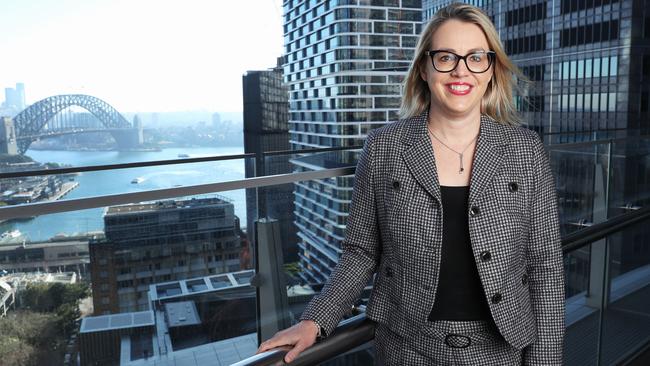Female leaders’ daft words are not doing anyone any favours
For all the hoo-haa about their importance, too many high-profile women are letting the side – and society – down with woolly public utterances.

Equally so, for different reasons, it’s hard to dislodge from one’s mind an ugly set of words.
A few weeks ago, a senior woman talking about gender parity said it’s simple – “it’s about more women coming in and more men going out”.
Emma Covacevich, the first female chief executive partner of one of Australia’s most esteemed law firms, conjured up the worst image for a workplace, which ought to be premised on fairness, logic and expertise.
Increasingly, daft words like this seem to emanate from women in senior leadership roles. It’s not that men don’t say dumb things too, but when women say them, the celebration of women in these positions means they are seen as role models for other women. Most of them relish the gender fame, until they stuff up. If only more of them understood that if you want to play first grade, it comes with scrutiny and responsibility.
On that score, it was not, by all reports, a merry day for men, or women, at Clayton Utz to hear, thanks to Covacevich, that parity at their firm appears to boil down to a brutish equation where expert legal skills take second billing to XX chromosomes. As much as the chief executive partner may wish to distance herself from what she told this newspaper, her words cannot be unsaid, even if they won’t be appearing – at least formally – as an addendum to her job title.
Not to labour the relevance of fairness, but test her equity equation by switching genders. More men in, more women out, anyone? Screeches of outrage would bellow from every woman – and many, many men too – because an enlightened society does not discriminate on the basis of sex. We have laws to drag even the stragglers to progress onto this same enlightened page.
So why would an educated new chief of Clutz – as we young lawyers used to call the law firm in the 90s – imagine that switching the genders in favour of women is a clever and fair thing to do? Are we dealing with wicked old-boys clubs where nothing less than a sledgehammer will do to deliver restorative gender justice? Does Covacevich wish us to believe she landed her plum job because she is female?
Not to labour the relevance of logic, but women are pouring into law schools at a rate of knots, more than 60 per cent, and filling jobs at law firms at a similarly fabulous pace. At Clutz, 65 per cent of graduate lawyers are women. While women make up 29 per cent of equity partners at Clayton Utz, one does not need a brain the size of Stephen Hawking (when he was alive) to wonder whether more women than men are choosing a different lifestyle to explain that drop-out rate. Maybe working an easier job as in-house counsel, or downsizing work to care for children rather than let a series of nannies do it. Only an ideologue would assume that women and men naturally compete for the same senior jobs in equal numbers and therefore should be represented 50/50 in those ranks.

In the dippy stakes, Ms Equity’s “more women in, more men out” approach to gender parity falls a whisker behind Annette Kimmitt, who was very confused about the purpose and values at Minter Ellison – until partners there provided some refreshing clarity by agreeing to part ways with Kimmitt.
This was back in March 2021 when, as Minters chief executive, Kimmitt emailed 2000-plus employees. She wrote that “it triggered hurt for me” to learn that the law firm was acting for then attorney-general Christian Porter.
“I know that for many of you it’s a tough day and I want to apologise for the pain you may be experiencing,” she added. The decision to act for Porter had not, she said, passed through “the lens of our Purpose and our Values”.
And what purpose and which values might those be? The core purpose of defending a person from unproven allegations, as happens in a democracy where a criminal justice system is premised on the fundamental values of a fair trial and the presumption of innocence?
Kimmitt was gone within days.
Though her email and departure made headlines, two other recent examples suggest that some women are getting a free pass from the scrutiny that their prominent positions should attract.
Last month, Federal Court justice Ian Jackman excoriated his judicial colleague Kathleen Farrell for failing to deliver a judgment for nearly three years before taking retirement on a full judicial pension, around three years short of mandatory retirement age. Her failure meant Jackman had to take responsibility for the matter and deliver judgment.
Instead of thanking Jackman and instituting steps to ensure this never happens again, the Chief Justice of the Federal Court, Debra Mortimer, offered him an implied rebuke. It was reported that Mortimer emailed her colleagues on the bench about the need for restraint and collegiality.
Concern for collegiality and kindness in the workplace is lovely but even grander is the fair and efficient administration of justice, not to mention an overriding concern for the poor litigants before Justice Farrell who had spent huge sums of money on litigation, putting their lives on hold for years while awaiting judgment only to be told Jackman had been reassigned the case on June 30 and delivered judgment fewer than four weeks later. A chief justice might have something to say about the judicial function, perhaps inserting some new KPI’s about finishing judgments, or proposing that absent health or other relevant disabling factors, judges can’t collect the pension until they have finished their judgments.

Too many women in senior roles appear to indulge in emotional blather as if it is part and parcel of female leadership. Last week, it was ACT Chief Justice Lucy McCallum’s turn. The Sofronoff report found that the ACT Director of Public Prosecutions Shane Drumgold behaved grossly unethically in critical respects including knowingly withholding crucial evidence from the defence, preying on a young solicitor to include false claims in an affidavit to hide the material, and then making deliberately deceptive comments in court to Justice McCallum herself.
A chief judge might, quite reasonably, be incandescent with rage and determine to take every legal step open to her to punish the wrongdoing and ensure it could never happen again. Instead, Justice McCallum issued a note to lawyers giving a quick nod to public scrutiny and then came the urging “to show kindness and respect towards each other at this time and (I) look forward to continuing to work with the local legal profession to build on the many strengths of this jurisdiction”.
To call this motherly drivel is to do mothers a disservice. This is drivel, plain and simple. What about the interests of the community in seeing fair and impartial justice, not to mention the interests of all those brutalised by Drumgold’s behaviour starting first with Bruce Lehrmann, of course, but extending to the ACT police, Linda Reynolds and Fiona Brown, among others?
The Chief Justice appears to care more about a few stern words aimed at Drumgold than these disgraceful injustices.
For all the hoo-haa about the importance of female leaders, too many high-profile women are letting the side – and society – down with daft and woolly public utterances.
We don’t need female leadership, whatever that entails, we need leadership to ensure that institutions do the right thing.








Months ago, I read this from Dante: “I love to doubt as well as know.” An exquisite and wise phrase will linger in the mind.